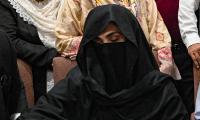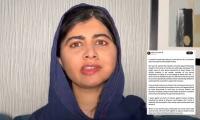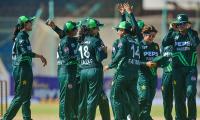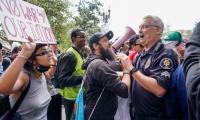LAHORE: Maulana Samiul Haq, often referred to as the "Father of Taliban" and the cleric who backed the Polio vaccination drive in December 2013 after initially opposing it on the grounds that the campaign was designed to kill Al-Qaeda Chief Osama bin Laden, is yet another eminent Pakistani religious personality who has met an unnatural death during the last three decades or so.
Samiul Haq, a radical Pakistani cleric, had called the Taliban’s one-eyed leader, Mullah Omar, an "angel" during his interview to the British news agency "Reuters" on September 15, 2013.
Research conducted by the "Jang Group and Geo Television Network" shows that although quite a few Pakistani prime ministers, presidents, governors, chief ministers, sitting and former ministers, noted front-line politicians, highly placed army and police officials have been assassinated during the last 30 odd years, numerous widely-followed religious scholars have also been targeted successfully by their foes.
Here follows the list:
On March 30, 1987, a globally-acclaimed Sunni religious scholar, Allama Ehsan Elahi Zaheer, had succumbed to his injuries after battling with death for 22 hours at a Riyadh hospital. He was seriously injured in a bomb blast. Zaheer had survived the blast and after initial treatment at Lahore’s Mayo hospital, he was transferred for further medical treatment in Saudi Arabia.
On March 7, 1995, Dr. Muhammad Ali Naqvi, a founder president of Imamia Student Organization, was killed.
On June 15, 1996, noted Shia leader and poet, Mohsin Naqvi, was killed in Lahore’s Allama Iqbal Town.
In January, 1997, the main leader of the banned Sipah-e-Sahaba or Lashkar-e-Jhangvi, Zia-ur-Rehman Farooqi was killed in a bomb blast near Lahore’s Sessions Court.
On August 5, 1998, the then Tehrik-e-Jafaria Pakistan Chief, Arif Hussain Al Hussaini, was killed in Peshawar. After having prayed at a local mosque, he was confronted by two gunmen and shot.
On April 12, 2000, an attack on a Shia Majlis in Shia leader Sajid Naqvi’s hometown had killed many of his blood relatives.
On March 4, 2002, one of the country’s most well-renowned nephrologists, Dr. Alay Safdar Zaidi, was assassinated in Karachi
On May 7, 2002, noted religious scholar Dr Ghulam Murtaza Malik, was shot dead by two gunmen in Lahore.
On October 6, 2003, MNA Maulana Azam Tariq (chief of the Sipah-e-Sahaba Pakistan) was assassinated by unidentified gunmen in Islamabad.
On May 30, 2004, a senior Deobandi religious scholar and head of Islamic religious school Jamia Binoria Karachi, Mufti Nizamuddin Shamzai, was gunned down in his car in the port city.
On May 30, 2004, a senior Deobandi religious scholar and head of Islamic religious school Jamia Binoria Karachi, Mufti Nizamuddin Shamzai, was gunned down in his car in the port city.
On July 14, 2006, Allama Hassan Turabi (a Shia religious scholar and chief of Tehrik-e-Jafaria Pakistan) and his 12-year-old nephew were killed in a suicide attack near his Karachi residence
On September 15, 2007, unidentified assailants had shot down former MNA Maulana Hassan Jan (a Jamiat Ulema-e-Islam leader and Wafaqul Madaris Vice Chairman) at Peshawar.
Maulana Hasan Jan had issued a fatwa against suicide attacks and had travelled to Afghanistan in 2001 to convince Mullah Omar that he should expel Osama Bin Laden from Afghanistan to avoid American attacks.
On August 13, 2008, a Khyber Pakhtunkhwa (KP) cleric Haji Namdar was killed. Haji was the leader of a banned local outfit "Amr Bil Maroof Wa Nahi Anil Munkar." Haji Namdar had earlier escaped a suicide attack on May 1, 2008.
On January 10, 2009, a fierce gun battle between rival sects in Hangu had seen the killing of Mufti Rustam, the deputy chairman of the local chapter of the Ahli Sunnat Wal Jamaat. Official sources said that at least 26 people had lost lives in this incident.
On January 26, 2009, Hussain Ali Yousafi (Chairman of the Hazara Democratic Party) was shot dead at Quetta.
On February 19, 2009, a Shia leader Sher Zaman was gunned down in Dera Ismail Khan. Tension had then led to imposition of a curfew in the city and Army called in to quell the riots, which had actually sparked after a suicide bomber had killed at least 30 Shias and injured another 157 who were attending Sher Zaman’s funeral.
On June 12, 2009, Sarfraz Ahmed Naeemi (a leading Sunni Barelwi cleric with anti-Taliban views), was killed in a suicide attack at the Jamia Naeemia Madrassa in Lahore.
On January 1, 2012, Askari Raza, leader of a Shia political organisation "Pasban-e-Jaferia," had breathed his last in a sectarian-motivated target killing in Karachi by two armed men. He was critically injured on the New Year’s Eve. At least 15,000 Shia protestors had then staged a sit-in outside the Sindh Governor House on the first day of January to protest the assassination.
On January 30, 2012, Haji Akhunzada, a commander of a banned militant outfit called "Ansar-ul-Islam," and three others were killed following a suicide attack outside the stalwart’s home on the outskirts of Peshawar.
On November 6, 2012, Agha Aftab Haider Jaffari, a prominent Shia leader was shot dead in Quetta.
On January 1, 2013, Malik Mukhtar Hussain, a prominent licensed organizer of Shia processions and majalis in Chiniot, had breathed his last after he was gunned down in an Imambargah on December 31, 2012 by six armed men.
On December 6, 2013, firing at Lahore’s Ravi Road had claimed life of an "Ahle Sunnat Wal Jamat" leader Maulana Shams ur Rehman.
In February 2014, noted religious scholar, Allama Taqi Hadi Naqvi, had succumbed to targeted sectarian violence in Karachi.
It goes without saying that Jamiat-e-Ulema Islam Chief Maulana Fazlur Rehman, has had at least three narrow escapes since March 31, 2011, though more than two dozen other people have instead lost lives in these attacks that have visibly been aimed at assassinating this prominent Pakistani cleric.
On March 31, 2011, an unsuccessful suicide bombing assassination attempt on Fazlur Rehman on the Motorway near the Swabi interchange in Khyber-Pakhtunkhwa had killed 10 people and wounded 20 other humans around the venue.
According to media archives, a suicide bomber riding on a motorcycle had detonated the explosives strapped to his body at a police checkpoint minutes before the former Opposition Leader’s bulletproof Land Cruiser had reached was set to enter the town of Swabi.
The Maulana was scheduled to address a public meeting as part of his pro- Colonel Qaddafi campaign against the Western coalition’s air strikes on Libya.
The suicide bomber was identified as one Irshad Afridi, a teenager from the long-embattled Khyber tribal region.
On April 1, 2011, Maulana Fazlur Rehman had survived a second suicide attack within just 24 hours.
This terror attack in Charsadda district had killed at least 13 people, injuring more than 30.
The Maulana, an alumnus of the renowned Al-Azhar University of Cairo, had blamed external forces for the attack and had later told the media that some unidentified "pro-United States militants" had targeted his vehicle at Charsadda’s Nowshera Road area.
Maulana Khalil Ahmed Mukhlis and Najeem Khan Advocate, the provincial President and Deputy Secretary General, of JUI-F’s rival "Ideology Group" had later asserted in media that the second attempt on the life of Maulana Fazlur Rehman was the result of his "duplicity" in national politics.
On October 23, 2014, yet another unsuccessful attack on the JUI-F Chief at Quetta’s Sadiq Saheed Ground had left at least four people dead.
Similarly another religious cleric from Multan and a former PPP Federal Minister, Hamid Saeed Kazmi, has managed to live on by defeating death.
Khawar Manika's counsel continued his arguments on Wednesday in a petition filed by Imran Khan and Bushra Bibi
IHC reserved judgment on the petition against registration of cases against former interior minister Sheikh Rashid on...
Saudi woman who was reportedly kidnapped from Islamabad’s residential Sector F-8 in mysterious circumstances, has...
Pakistan Navy warship rescued 8 Iranian fishermen after their boat caught fire in the open sea
SC dismissed appeal against SHC order that turned down application of partner seeking extension of time to furnish...
Executive board of International Monetary Fund will meet on April 29 to discuss the approval of $1.1 billion funding...







